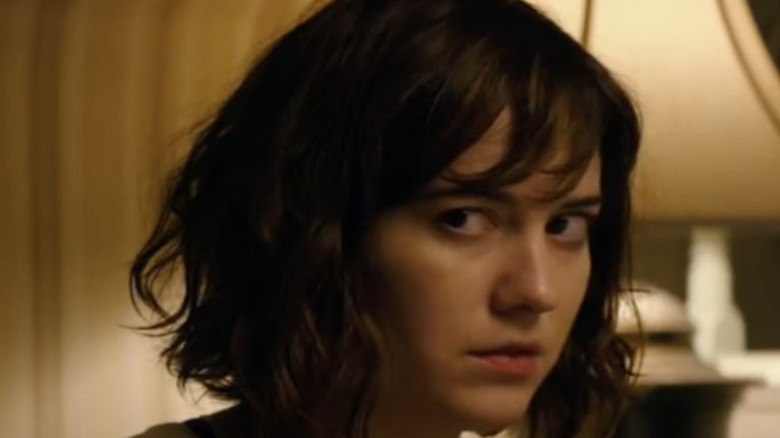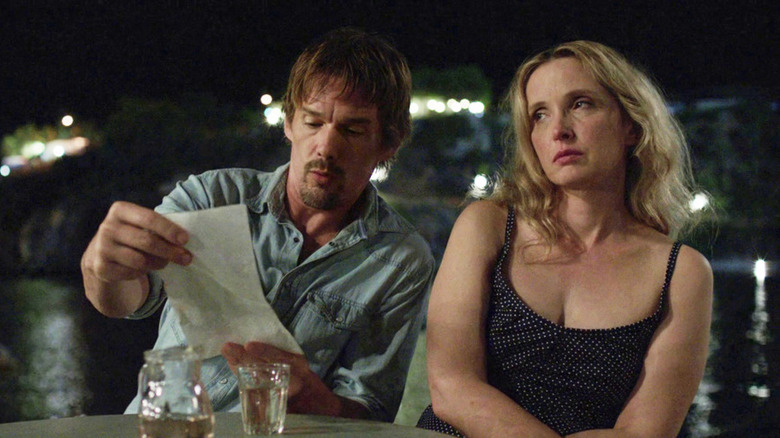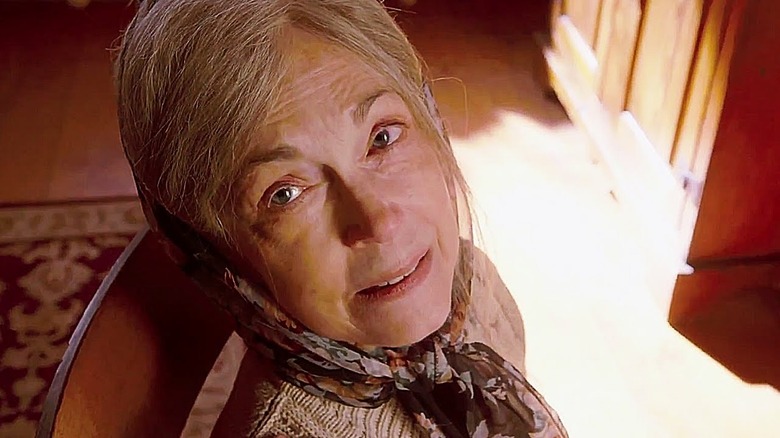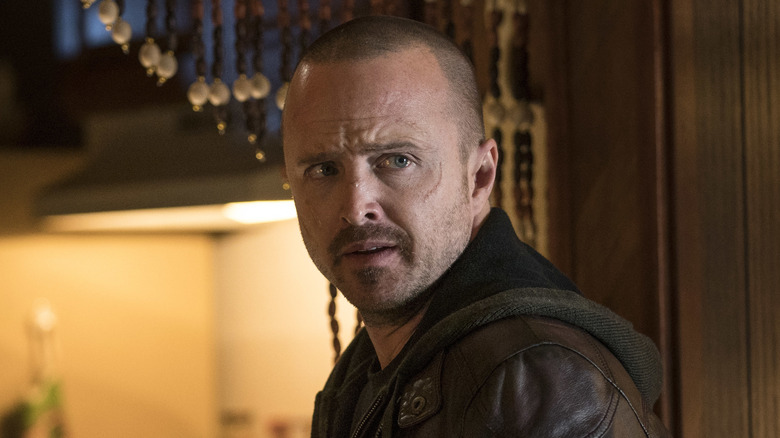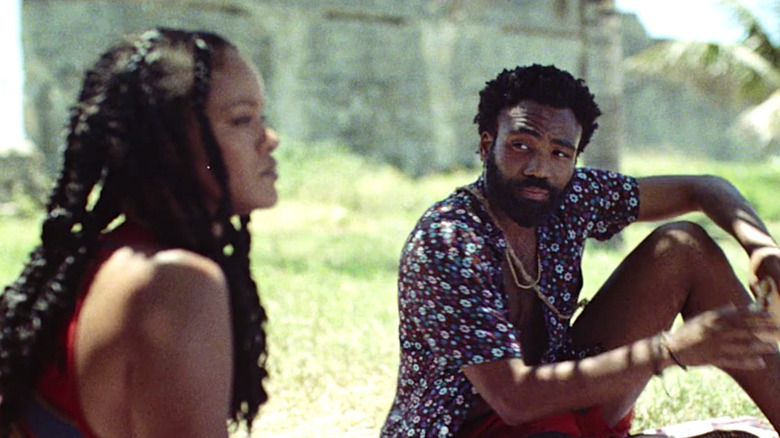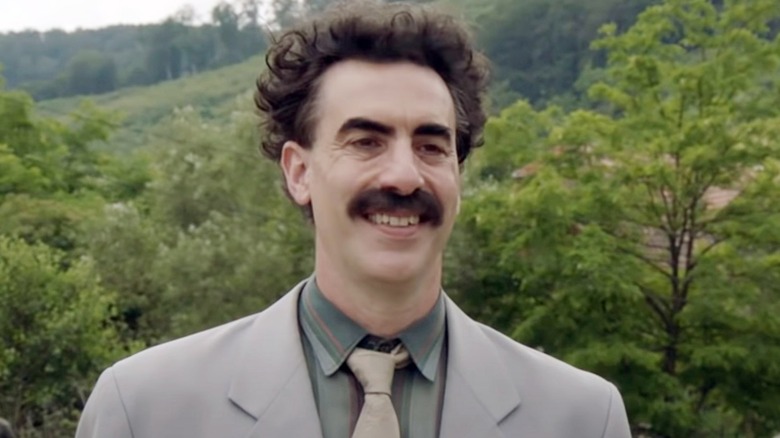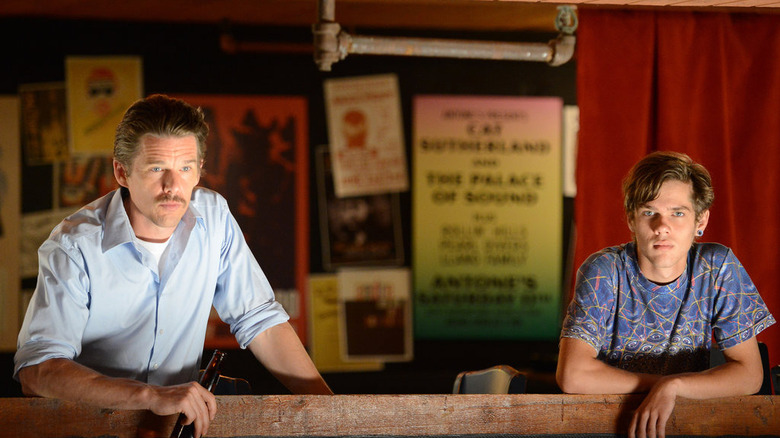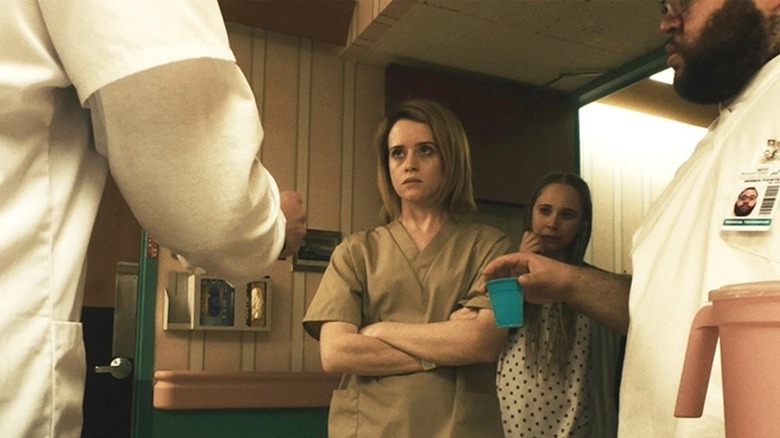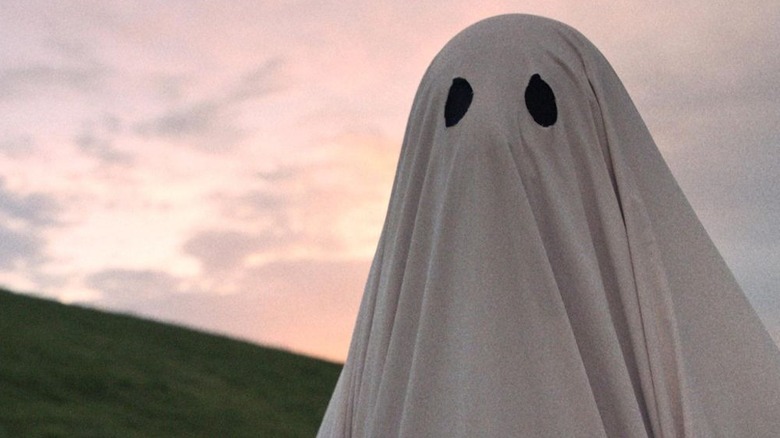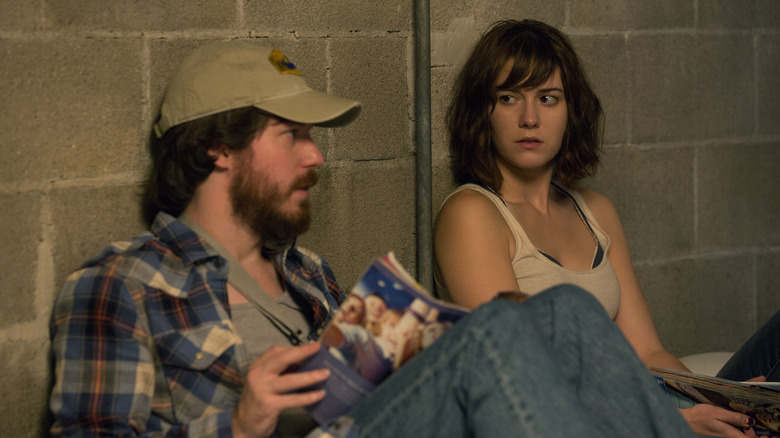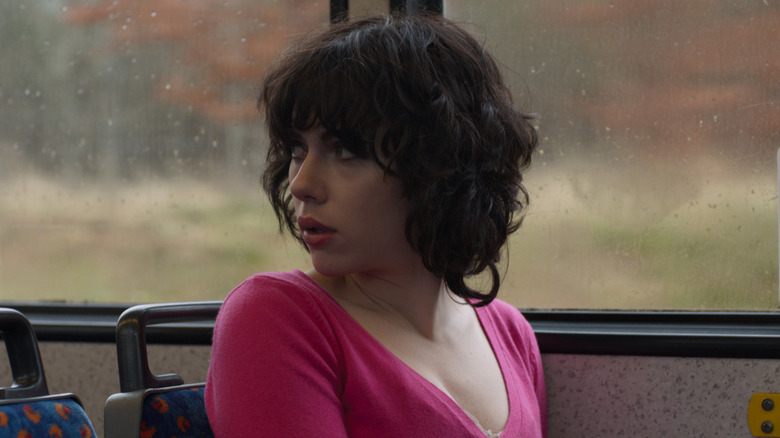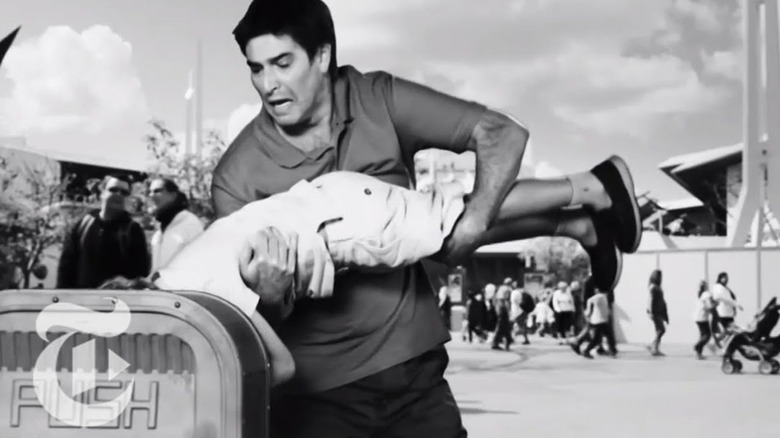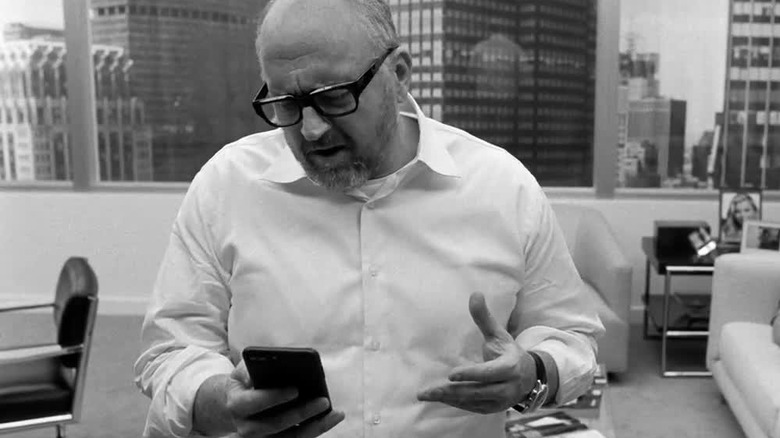Movies That Managed To Be Filmed Before We Even Knew About Them
Movie enthusiasts in the internet age have become accustomed to tracking a favorite project from inception to completion. As such, when the occasional project appears overnight that has been seemingly off everyone's radar, it can feel like waking up on Christmas morning to a present under the tree.
This element of surprise can give an edge to certain projects, raising intriguing questions about why — in an industry where hype is as valuable as the name above the title — they were conceived, scripted and shot without any. Reasons vary — especially when it comes to sequels and spin-offs — and these films don't always turn out to be fantastic. But, if they do, the achievement can be even more rewarding.
The marketing for most movies begins years before the final product is released, so it's quite impressive that some filmmakers are still willing to take the risk to create a true surprise. Below, a breakdown of modern movies that somehow remained under the radar of film fans.
Before Midnight (2013)
Richard Linklater's "Before" trilogy is beloved by many, and arguably one of the most vivid, authentic depictions of love (and its day-to-day remnants after the so-called "happy ending") in the history of cinema. But in order for it to come together, the "Dazed and Confused" filmmaker had to reunite actors/collaborators Ethan Hawke and Julie Delpy in relative secrecy to try and re-create the largely-spontaneous chemistry created in the 1995 classic "Before Sunrise" and teased in its 2004 follow-up "Before Sunset."
Prior to 2012, fans were well aware that nine years had passed between "Sunrise" and "Sunset," and now another nine were on the verge of expiring, so a third part felt like it should arrive in 2013. "Sunset" also ended with one heck of a cliffhanger, as "Baby, you are gonna miss that plane" had become a modern-day classic in final movie lines — and people had spent nearly a decade wondering where a perceived tryst would deposit Jesse and Celine.
In the summer of 2012, Hawke told Indiewire that shooting for the sequel was going to begin soon; his co-star Delpy denied it a month later. Sure enough, in September of 2012, news of the film was officially confirmed by a Deadline report that said it "wrapped late last night."
"It's great to be back together again," said Linklater, Delpy and Hawke in a statement, "this time in beautiful Greece to revisit the lives of Celine and Jesse nine years after Jesse was about to miss his flight."
The resulting film, "Before Midnight," was a critically-acclaimed masterpiece that is not only considered by many to be the best film in the trilogy, but also offers viewers the all-too-rare opportunity of watching a married couple grapple with the hard work and arduous day-to-day that ultimately determines whether a marriage lasts. Since last seeing them, "Before" fans learned they had become parents to two girls — and faced ups and downs, constantly coming back to the same disagreements that threaten to diminish the passion and love audiences remembered so fondly from the previous two films.
Ultimately, "Midnight" concluded on a mixed note after a devastating fight, with the portrayal of their relationship feeling more real than ever; 2022 marks nine years after "Midnight" — and fans would love nothing more than to wake up one morning, surprised by another "wrapped late last night" announcement.
The Visit
M. Night Shyamalan is famous for his unexpected twists — and in 2015, he pulled off a real-world shocker.
Coming off four consecutive blockbuster under-performers in "Lady in the Water," "The Happening," "The Last Airbender" and "After Earth," Shyamalan ditched the big budget and went back to his Hitchcockian roots with an atmospheric thriller. Investing his own money ($5 million), he wrote and directed the found-footage flick "The Visit," about some kids who grow increasingly suspicious of their grandparents' eccentricities.
When shooting was completed, he went from one Hollywood studio to another, earning rejections. Eventually, Universal Pictures offered him a deal to distribute the film under Blumhouse Productions if he was willing to make some required edits. The agreement worked out for both of them: "The Visit" was praised by critics, put Shyamalan back on the map, and made over $98 million at the worldwide box office. Since the film's release, Shyamalan has kept the momentum strong for this latest chapter in his career, making "Split" and "Glass" to complete a trilogy with "Unbreakable," then releasing the buzzed-about "Old" and the Apple+ series "Servant," recently renewed for a fourth and final season.
El Camino: A Breaking Bad Movie (2019)
Anyone who watched Vince Gilligan's "Breaking Bad" knows the ending of the series stuck its landing. Yet, that doesn't mean fans didn't want to see more from the same universe after Walter White's (Bryan Cranston) story reached its inevitable conclusion.
Well aware of this, Gilligan created the spin-off series "Better Call Saul" and made a feature film with an extended tale focused on Jesse Pinkman (Aaron Paul). Keeping the movie a surprise, Gilligan never mentioned "El Camino: A Breaking Bad Movie" until Netflix announced its official arrival in 2019, just a few weeks prior to its release date.
Gilligan did his best to keep the project under the radar. The film had a fake working title ("Greenbrier"), and the cast and crew members were asked not to tell anyone about what they'd been working on. He also instructed his actors not to be seen together off-set and to deny the project's existence to the press. It was a job well done, clearly, as all this secrecy somehow allowed a film version of one of the most revered shows in TV history to be made without the internet learning of it, and ultimately this somehow made the film feel more rewarding to watch.
Following Pinkman after his escape from the compound where he was being held captive by Todd Alquist (Jesse Plemons) and his uncle's Aryan gang, "El Camino" gave viewers a Jesse on the run from the DEA and the police, who view him as a dangerous criminal. According to NME, the Gilligan-directed film was watched by more than 25 million households in its first week of release.
Guava Island (2019)
Donald Glover's boundary-breaking one-hour-long feature "Guava Island," almost felt like a secret album from Childish Gambino (his stage name as a musician), but its powerful message might be superior to the songs Glover sporadically performs. One of the reasons it's such a refreshing picture is that Glover, his long-time director Hiro Murai and Rihanna shot the film hidden from the public eye in Cuba. Facilitating a secret that involves two well-known public figures is a tall task, but somehow it didn't distract from the quality of the work; the end result was a success that impressed both critics and fans.
The plot follows Deni Maroon (Glover), a beloved small-time artist in Guava Island, organizing a festival for the locals to be held on a Saturday night. His sweet girlfriend, Kofi Novia (Rihanna), supports Deni but is worried about him because the island's dictator-like figure Red (Nonso Anozie), a businessman who provides employment for most of the people in Guava, has a reputation for exploiting cheap labor.
When he learns about Deni's plan, Red kidnaps the singer and tells him to cancel the festival or there will be consequences. In the face of tragedy, locals unite, as the film makes a memorable statement about the power of music.
Borat Subsequent Moviefilm (2020)
You'd think after all the fake personas that Sacha Baron Cohen has crafted over the years (Ali G, Bruno, Borat, to name a few) and all the people who have fallen prey to his tomfoolery (people, politicians, celebrities, white supremacists), everybody would be able to spot him a mile away by now. But then he came up with a most unusual gameplan to film a sequel for his most famous movie, 2006's "Borat: Cultural Learnings of America for Make Benefit Glorious Nation of Kazakhstan."
Touching on the COVID-19 pandemic, this second film about his eternally optimistic, dim Kazakh journalist had Cohen taking far more substantial safety precautions (as in, a bulletproof vest) than masks and social-distancing. In the sequel, Borat travels back to America with a personal mission to deliver a gift to then-US president Donald Trump. However, when his plan falls apart, he decides to deliver the present — his newly discovered 15-year-old daughter, Tutar (Maria Bakalova) — to vice president Mike Pence instead.
Although the comedy may not have become as much of a cultural juggernaut as its predecessor, "Borat 2" was still praised by critics and viewers, with Bakalova (who is indeed an actor) nominated for a Best Supporting Actress Oscar.
Boyhood (2014)
Another Linklater/Ethan Hawke collaboration that involved some degree of secrecy, the director spoke in 2002 about his ambition to film the project.
"I've long wanted to tell the story of a parent-child relationship that follows a boy from the first through the 12th grade and ends with him going off to college," he told the Philadelphia Inquirer. "But the dilemma is that kids change so much that it is impossible to cover that much ground. And I am totally ready to adapt the story to whatever he is going through. Even if he's got acne, we'll go with that."
Flash-forward a decade later and Linklater and Hawke had worked on numerous other films, with this so-called "12-Year-Movie" fading into obscurity. But under the radar, Linklater, Hawke, Patricia Arquette and young Ellar Coltrane had been secretly meeting every year, banging out a handful of scenes.
In 2006, MTV News caught up with Linklater while he was doing press for "Fast Food Nation," and the auteur confirmed for the first time that footage was indeed in the can and moving forward.
"I'm in my fifth year of a 12-year project," he said in an article cheekily titled "Got Plans for 2013? Check Out Richard Linklater's '12-Year-Movie." "Every year, I get together with the actors and we film a little bit ... it's about a kid growing up — that's the gist of it ... I haven't even put the math to it yet [of when it would come out] ... I just know that we have fun every year getting together and doing this."
By 2014, Linklater had a coming-of-age masterpiece dubbed "Boyhood" on his hands that would become a bona fide phenomenon, depicting a child of divorced parents who comes of age in Texas. Critics were amazed by the film and it became an awards-season juggernaut, earning an Oscar (and a best picture nomination), three Golden Globes, and two BAFTAs.
Unsane (2018)
An experimental Steven Soderbergh psychological horror film, "Unsane" was shot in complete secrecy with a small crew in 10 days — all done with an iPhone 7 Plus.
Serving as a reminder that this ambitious, creative filmmaker wasn't going to rest on his "Ocean's" and "Magic Mike" laurels, Soderbergh did this film down and dirty, and critics loved the flick, which made nearly $15 million at the box office on a miniscule $1.5 million budget.
The plot follows Sawyer Valentini (Claire Foy), a woman traumatized after becoming the obsession of a stalker named David Strine (Joshua Leonard). To deal with her trauma and escape her harasser, Sawyer leaves Boston and her family and friends and gets a job in a different town hundreds of miles away. But the change of scenery doesn't necessarily help with her neurosis; she sees David everywhere, despite knowing that, rationally, he couldn't be there. So she seeks help from a counselor at Highland Creek Behavioral Center. During her session, she admits to having suicidal thoughts in the past, and her therapist tricks her into a voluntary one-day admission to the psychiatric hospital. But the nightmare only really begins when she learns that David is one of the staff members of the nursing crew. The question then becomes: Is her stalker really there, or is she going insane?
A Ghost Story (2017)
David Lowery's meditative existential drama wasn't shot in secret to surprise viewers. It was made that way because the director hadn't been entirely sure if the movie would actually work out.
In a 2017 interview with Comingsoon.net, he talked about how the idea for "A Ghost Story" emerged: "I had been wanting to make a movie with a guy in a sheet for a while. I just loved that image. I love taking something that is understood to be funny or charming or sweet or naive and instilling it with some degree of gravity." He also added, "I still want to acknowledge that it's a goofy image, but I like the idea of giving some emotional heft to a symbol like that."
This strangely compelling drama turned out to be something truly unique that audiences hadn't seen before. The film follows a recently deceased man (Casey Affleck) who returns to his wife as a ghost, trying to reconnect with her because he isn't ready to move on. Although the story might sound simple, it's hard to explain the true meaning of this arthouse flick that laments grief, love, and existence. Sometimes, you've just gotta see the movie.
Lowery was on to something, because the film was praised by critics and, despite its experimental aspect, became a modest box office success.
10 Cloverfield Lane (2016)
The 2008 found-footage flick "Cloverfield" was one of the first true "viral" movies, hyped up by months of unorthodox marketing that held back key details about the film, refused to show the monster, and sent fans down a rabbit hole of mystery box product placement.
The film was a hit, and speculation began years later that a JJ Abrams-produced film with names like "The Cellar" and "Valencia" was actually something more. As the story goes, during production the filmmakers noticed that there were similarities between their film and "Cloverfield." So in no time, Abrams and director Dan Trachtenberg began leaning into such links, with the former calling the film a "spiritual successor."
Supposedly, two out of its three leads, John Gallagher and Mary Elizabeth Winstead, had very little knowledge of how this project would tie into the same universe as "Cloverfield." Abrams only gave the final title for the horror flick right before its first trailer came out. His maneuvering paid off: "10 Cloverfield Lane" became a box office hit — making over $110 million on a $15 million budget — and critics appreciated its craft, setting, and performances.
The film takes place in an underground bunker where a woman named Michelle (Winstead) is held captive by a man named Howard (John Goodman). He tells her that a catastrophic event has made the outside world uninhabitable. But whether that's the truth or Howard is a psychopath playing games is one of the film's great mysteries.
Under the Skin (2013)
The making of this spooky arthouse horror wasn't necessarily a secret, but it took director Jonathan Glazer over 10 years to get the film off the ground, and several scenes were shot with hidden cameras. These were unscripted sequences with non-actors while the movie's star, Scarlett Johansson, was getting instructions from the director through an earpiece. It's a bizarre and dangerous method to make a feature, but when you bare witness to its concept and theme, it works in what is one of the weirdest sci-fi horror films ever made.
The plot follows an alien disguised as a seductive woman (Johansson) who hunts innocent, lonely men on the streets of Glasgow. Once captured, she sends them into a shapeless other dimension, where they serve as nothing but meat. Why does the alien do this? What is its purpose on Earth? And why would she choose such a grim and dark place like Scotland to stalk her prey? Well, that's something to be interpreted by the viewer.
Escape From Tomorrow (2013)
Randy Moore's nightmarish feature debut, "Escape From Tomorrow," wasn't shot in secret to surprise viewers or fans. It had to be done this way because most of its scenes were shot in Walt Disney World and Disneyland without legal authorization.
Moore depicted iconic cartoon characters as being violent and terrifying, subject matter for which he knew the company would never grant permission. He went to such extreme lengths to avoid being sued as doing post-production and finishing the film in South Korea. But ultimately, instead of a legitimate lawsuit, Disney chose to ignore the entire fiasco to avoid giving the project more attention.
The strategy worked, because "Escape From Tomorrow" never really attained the buzz it was looking for to fuel its release. In the years since, it has become a bit of a cult movie, although critics and audiences didn't give it much credit back in 2013.
The surreal, disturbing plot of "Escape" follows an unemployed father and his family on their last day of vacation at Disney World. There, he has a strange encounter with two underage girls, which results in weird, horrific visions that make him question his own sanity.
I Love You, Daddy (2017)
In 2017, Louis C.K. surprised his fans and the film world by announcing that he had written and directed a dramedy called "I Love You, Daddy" that would premiere at the Toronto International Film Festival. At the time, he was an acclaimed, beloved comedian and the voice behind the groundbreaking series "Louie," and this was to be his first feature-length directorial effort in over a decade.
The news was made even more intriguing by the high-powered cast he had lined up: Chloe Grace Moretz, Charlie Day, Edie Falco, Albert Brooks, John Malkovich, Rose Byrne and more. The film seemed to walk a dangerous line, telling the story of an aging filmmaker with a thing for young women. It premiered at the festival on September 9, 2017 — and that same month Vanity Fair ran an interview with comedian Tig Notaro where she cut ties with her collaborator and alluded to an "incident" between them.
Swept up in the fast-rising #MeToo movement, it wasn't long before additional details of C.K's past behavior emerged. He was effectively canceled, and "I Love You, Daddy" vanished in the collateral damage. The comedy-drama received a minimal release and wasn't well-received by critics and audiences, with C.K.'s ongoing scandal adding a cringe-worthy added meaning.
Ultimately, this is one movie that probably should have remained in hiding. "[It is] the movie version of a pervert in a raincoat flashing you," wrote Matt Zoller Seitz in his review for RogerEbert.com. "Deftly enough that you aren't sure you saw what you saw."
